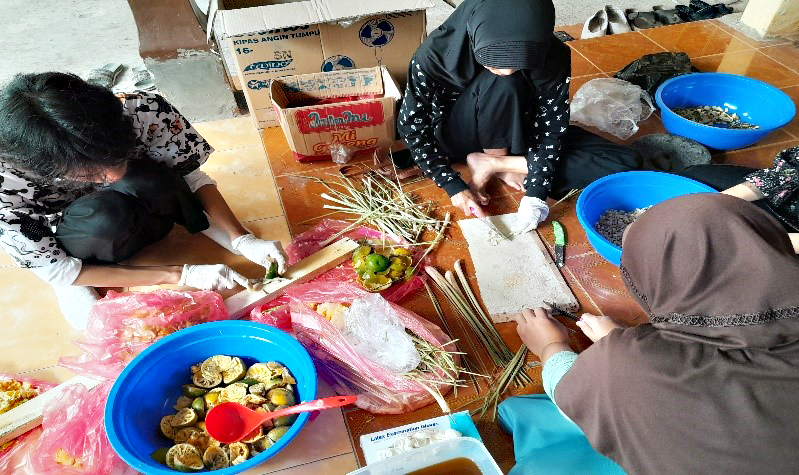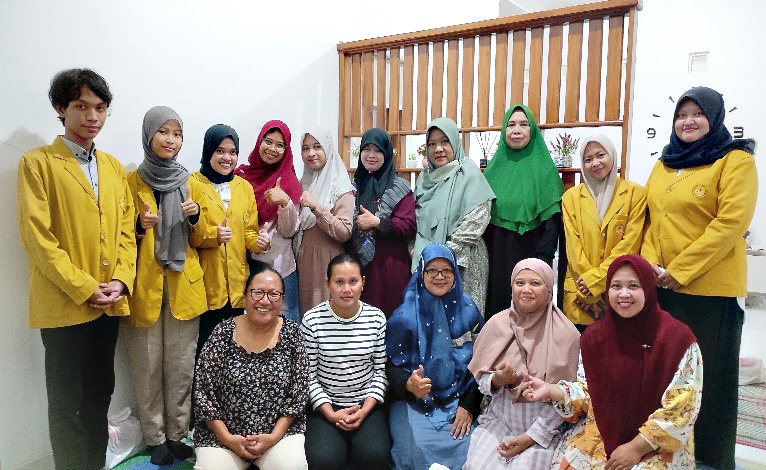UNSOED Students Provide Training on Processing Organic Waste into Eco-enzyme
[unsoed.ac.id, Wed, 02/08/23] The Covid-19 pandemic has brought a new hobby into people's lives, one of which is nurturing plants. However, what if all these plants that have been nurtured and cared for with all our hearts are damaged by insect pests? Surely this is a concern of its own. This was experienced by PKK members in Karangsalam Kidul Village, Kedung Banteng Subdistrict, Banyumas Regency, which is located in Sapphire Regency Residence, Jl. KS Tubun, West Purwokerto. Apart from this insect pest problem, PKK members also experienced problems related to the disposal and processing of organic waste from households that can produce 5 kg/house per day. This is exacerbated by the irregular schedule of garbage collection by the garbage collector until a buildup of garbage occurs. This condition lures animals such as cockroaches, flies, and ants. It is well known that these animals are residential insect pests that can be detrimental in terms of health, economy, and aesthetics.
This problem has inspired five students of Jenderal Soedirman University, namely Raihanah Alya Zahra, Anisa Permata Aulia, Khofifah Noor Fatihah, Jumia Rosiyani, and Shidqi Ryza Nugraha from the Biology department to provide solutions to overcome the waste and insect pest problems in this residential area. The solution offered is to transform organic waste into something more valuable. One of them is by processing it into eco-enzyme which can later be used as a natural insecticide to deal with insect pests.
Raihanah Alya Zahra as the team leader explained that this program, apart from aiming at tackling the problem of waste and insect pests, also has several other objectives. These objectives are improving knowledge about waste processing and recycling, educating people about insect pests and their impact on society as well as how to overcome them, and evaluating the effectiveness of monitoring training activities to provide knowledge about eco-enzymes that are beneficial as natural insecticides.
"Eco-enzyme itself is a fermented liquid from organic waste of fruits, vegetables, vegetable stems, and any other organic waste that has many benefits. The benefits of eco-enzyme are divided into three, such as for agriculture (as liquid organic fertilizer, vegetable pesticide, vegetable insecticide), for health (as disinfectant, cleaning liquid), for household (as a substitute for bath soap, floor cleaner, mouthwash). However, in this program, the team focuses more on its benefits as a natural insecticide," she explained.
At present, this training program is one of the 2023 Student Creativity Programs (PKM) that has been funded by the Ministry of Education and Culture. Dr. Trisnowati Budi Ambarningrum, M.Si. as the supervisor, hopes that this creative idea can inspire the younger generation and other communities to process organic waste, both that produced by themselves and others.
Raihanah further explained that ingredients used as natural insecticides include orange peel and lemongrass. These materials are not favorable to insects because orange peels have a limonene concentration of 90-95%. Limonene is a chemical compound that is toxic to ants, mosquitoes, flies and other insects. Furthermore, lemongrass contains citronellol and geraniol, which are active ingredients that insects dislike and avoid. In the making of eco-enzyme, we used a formulation of 6:3:1 where 60% clean water, 30% vegetable waste or fruit peels (consisting of 15% orange peel waste and 15% lemongrass) and 10% brown sugar. The ratio of the insecticide itself is MES 1 kg, 750 grams of /technical salt and 4 liters of eco-enzyme.
"One of the other specialties of eco-enzyme is that it does not require a large area in the fermentation process as in composting, and does not even require a specific container. Eco-enzyme only requires media the size of a bottle so that it can save processing space. Used bottles can also be reused as fermentation containers. This also supports the concept of reuse," she said.



